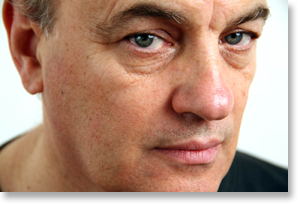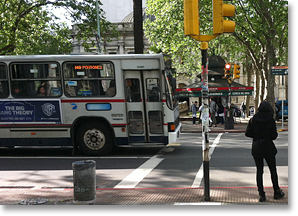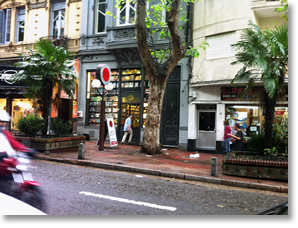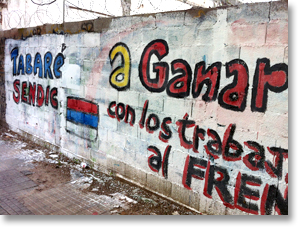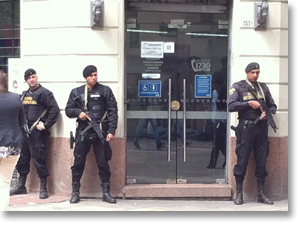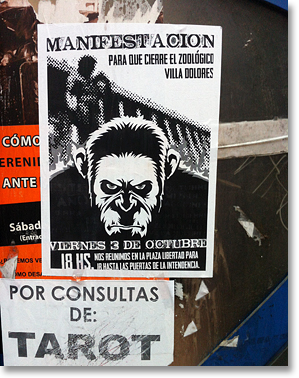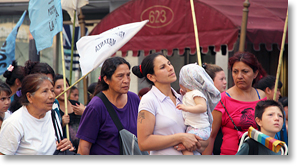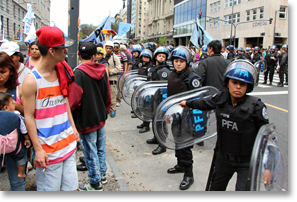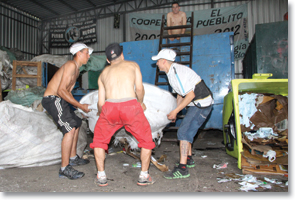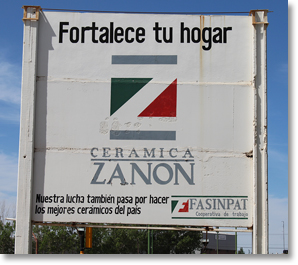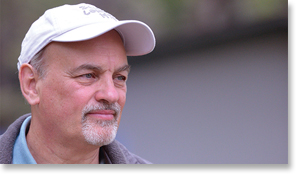|
An Interview with Raúl Zibechi
A Civilizational Crisis: Different Paradigms and Different Ways To Build Them Montevideo, Uruguay
Interview Quick Links:
A student, a teacher, a journalist Raúl Zibechi: I’m 62. From when I was sixteen, I began to be an activist in the student movement in Uruguay, in Montevideo. It was with an organization called Frente Estudiantil Revolucionario, the Revolutionary Student Front that was in a relationship with the Tupamaros organization. After that I studied history in the university. In 1973 the coup d’état came and I flew out of the country -- to Argentina first, and then to Spain. There I continued my former studies, but for myself -- autogestión. I went to Madrid, in Spain, for 16 years. I was a militant there in some movements and in a party. I was a teacher in people’s literacy in southern Spain, in Andalucía. I returned here as a journalist, as a teacher working with movements. Not doing paid work, but as we say in Spanish, acompañar, going with the movements on the same road as companions. This is, in a few words, my little biography. In Motion Magazine: Can you talk about the Tupamaros? Raúl Zibechi: The Tupamaros were a guerilla organization, an army, and I was in the student front. There were different parts. I was not in the military part. I was in the mass part; the work with the people, as a student. Soon after I joined the organization there was a rupture and a little group split off and created another armed organization. This was just before the coup. 1971, ’72. The coup was in ’73. By ’72 the Tupamaros were broken by the repression, by the army, the state. When the coup happened, the Tupamaros were dead as an organization. Everyone was in prison. The disappearing intellectuals In Motion Magazine: I read an interview in which you talked about the concept of “the disappearing intellectuals”. Not physically, but as intellectuals. Can you talk about that? Raúl Zibechi: I believe that before the coup d’état we used to have a social role that wasn’t a formal role though it was very real. It was the intellectual: the teachers, writers, researchers, people who were at the same time militants. But after the dictatorship, we had a division. The militants and the professionals with ideas were separated. There was a break. This was common. There had been a lot of people doing this work as intellectuals and as militants, but after the dictatorship few continued in this way. Why? Because the professionals, the researchers, they are a new middle class, a new high-middle class. They are earning a lot of money. You know, in universities now, here in Uruguay and in all Latin America, people are earning a lot of money. Why? I think because the dominant class realized that they must break this link between intellectuals and militants. They must cut this connection. And the best way to cut it, they found, is with money. Pay a lot and extend the study period. Thirty years ago, people finished their time as a student at twenty-two, twenty-three years old -- perhaps twenty-five. Now, you have post-graduate studies and this extends the university period. You have people with thirty-five, forty years studying in the university with scholarships, grants. They have a way of life as universitarians. Militants, on the other hand, have experienced very hard repression. The repression was very hard on them. Money and repression. A lot of people, they chose the professional way of life. So, there was a break -- political and cultural. And this is very important. This removed the contribution of this sector from the social struggle. All the movements of the world since the French revolution have been based on this mixture, this confluence of people’s fighters and intellectuals. When you undo this confluence the movements fall apart. In Motion Magazine: In one of your recent essays you wrote about movements educating themselves -- Indigenous people, the excluded. Can you talk about this? Raúl Zibechi: This is happening for various reasons. One is what I was just talking about. Many professionals are leaving the struggle, so the movements are left alone. But also, the political parties are weakened. Before, the parties did training and education for the movements. The universities also did it but, as I said before, these two elements have parted. The states have left the popular sectors with very poor quality education, or no education. What we have seen emerge in the last thirty, twenty-five years, was popular education as influenced by Paulo Freire. That is what the movements need now to construct their own vision of the world, their own Weltanschauung (cosmovision). The movements have to train their own militants because the days are gone when they used to collaborate in training with the parties, and in the universities, and indirectly through the state in the schools and secondary colleges. They are in crisis. But also something else is happening. In the last thirty years, new social actors have emerged, such as the Indigenous people. These actors have a vision of the world, a cosmovision, which is different from the hegemonic Western cosmovision. This factor, for me, is very important as it influences different sectors, different movements which need, for example, to think about the limits of development. Development has limits and only the social movements can reflect on the limits in a non-development way. This is very interesting because with the Western ideas you can’t build a way that is different from development. This is what I think. They must look for these new ideas in the Indigenous experience, in the mestizo experience, and also in the Black movements experience, the Black cosmovision. To build in this different way you need education, self-education, collective self-education. This is necessary because these new ideas, they are not just there for the taking. They must be constructed collectively. This is new in the last two hundred years. Normally, the labor movement says, what will it do? Normally, there is the political culture. The system has some ideas and so it is necessary to refer to these ideas and we use these ideas – technical, professional, political, philosophical. This was what Marx and Lenin did, and also Bakunin, but not so Kropotkin; most of the parts of the anti-system movements. But now the Western civilization is in crisis. This crisis is not only economic, it is not only environmental, it is not only a social crisis, it is also a civilizational crisis. And when a civilization is in crisis you need to build or to look for anything different. This is where we are. But, as I said, the Indigenous people’s thoughts they are not simply here, complete, and we just take them. No, it is different. We must collectively construct these new thoughts, this new vision of the world – and in practice, not just by reading. Doing and reflecting. Not only are there different ideas or different paradigms, there are also different ways to build them. In Motion Magazine: In the United States, most people are aware that much of South America was colonized by Spain and Portugal but many people are not aware of what happened with the dictatorships down here. I know you have studied this a lot, and lived it. Can you talk about the dictatorships in Uruguay, Argentina, Chile, and other countries and the role of the United States within that whole process? Raúl Zibechi: I believe that beginning with the ’70s, and this is not my idea but the idea of Giovanni Arrighi and Manuel Wallerstein and others ... (Brief side discussion about Arrighi.) Raúl Zibechi: He’s incredible, yes. His analysis on the 500 years of capitalism, this is very important. Anyway, at a certain moment, at the end of the ’60s, the beginning of the ’70s, the world bourgeoisie decided to make a profound change. They said, "Welfare, no more!" because the lower classes were getting too much power with welfare. “The working class has too much power, and our power is weaker.” So, they made this break and this meant very important changes in the first world -- for example, in the United States, in Europe. In the United States, it meant a very forceful repression of the Black Panthers but also the spreading of drugs in Black neighborhoods. There was a paradigm shift. There was a change in Fordism, in the method of manufacturing. They moved to automization. Before the ’70s, there were many workers in a factory. Now there are few workers. They dismantled the great factory -- Detroit. In Latin America there was repression, coups d’état, because in Latin America there was profit, just the same as in the United States and in Europe. But the change came here by destroying an entire generation of social fighters. For that came the coups d’état to clean up socially and politically and construct a new economic model, which is what we know as neoliberalism -- a new economic model that today is dominant. And they did that with blood and death - death and blood. An economic model that already doesn’t need a great part of the population To this day we are suffering from this change. This change means that the dominant class renounces democracy. Formally, there are elections, but you know that in the year 2000 there was electoral fraud in the United States. Something that previously was unthinkable. It wasn’t in people’s heads to think that it was possible to see electoral fraud in the United States. George Bush, Bush the second. And we don’t even know what happened on September 11. I don’t believe in the conspiracy theories that the CIA did it, but probably those in power knew, as happened in Pearl Harbor, that something was being prepared. We don’t know yet. So, there was an important change in direction, first to abandon welfare, and progressively a turn to ... At the root of Thomas Piketty’s book is a series of data which others worked on which shows that until the ’70s, of each $100 of new wealth created the top 10 percent (of the population), the rich, appropriated $20 -- and the other ninety percent took $80. Fine. Today, of each $100, the top ten appropriates all the $100, but also the $20 the ninety percent have saved! This isn’t just surplus value. This isn’t just capitalist exploitation. It is theft. But how do we understand Ferguson? Police violence in the United States is very strong. There are studies done since 9/11 that indicate that the state has made the police very repressive, inciting this sort of thing. And, if this is happening in the United States, which is a country of liberties and rights, imagine what is happening in Brazil and Argentina where a part of the population is no longer useful for the reproduction of capital. We are going to a capitalism, an economic model that already doesn’t need the greater part of the population. This is terrible. This is terrible because, demographically speaking, in the last two or three centuries there has been a growing and permanent increase in the number of the people in the world. Before, there was more sickness, epidemics, but in the last three centuries we have become more and more people in the world and part of the dominant class is thinking, "How can we return from seven to three billion people in the world.” This is very problematic but we must see this clearly. We have to know that this is a possibility. Brazil: it must make its backyard In Motion Magazine: I know you have spent a lot of time studying Brazil. Could you speak about the growth of Brazil and its power in Latin America and in the world? Could you talk about that and also the impacts on the social movements? Raúl Zibechi: Brazil is one of the five largest countries in the world, in terms of area, population, and natural riches: the United States/Canada, Russia, China, Brazil, India. So, naturally, it must be one of the great powers of the world. Fifty, sixty years ago, the Brazilian military and the Brazilian bourgeoisie took the road of converting Brazil into a great power. Why? Because they reason that if Brazil doesn’t become an important country, doesn’t want to do that, then the internal situation will be grave and will lead towards revolution and crisis. As in China and in India, if there is no strong economic growth, an economic expansion, the popular sectors are going to rise up. This implies very important changes throughout the South American region because Brazil must make its backyard. All countries that have become great powers have needed a backyard. Think capitalism. Spain and Portugal had America as a backyard. England had all the world, particularly India. The United States had Mexico, the Caribbean, and South America. What is the backyard of Brazil? South America. This is a very important change for the social movements because it is the first time in 500 years that we have had a new great power actually in South America, and not external such as Spain, Portugal, England, or the United States. With Brazil, we have a big country that has a frontier with most of the countries in South America. This has changed, very heavily, the relationships with the movements, including the regional movements. The people are losing trust in the governments I say that the current progressive period began in 1989 with the Caracazo (a popular uprising in Caracas) in Venezuela, and perhaps it ended in June 2013 in Brazil with the mobilizations. It is not that all the governments are retreating, no, the progressive governments continue, but they can’t make changes as they did in the first years of these movements because the social climate has changed. We have today a conservative climate in Brazil. It is a reaction to this new activism. This is normal in the world. After ’68 in France, there was a conservative movement. After the ’60s movements, the movement for the rights of the Blacks in the United States, the civil rights movements in the United States, the conservatives came with Nixon. This is a normal reaction. But this is not only in government, it is also in society. The society reacted in a conservative way. It is normal. I believe that we are in the final stage of the progressive movement, that it can last maybe five years more. There were 10 years between the Caracazo and the arrival of the Chavez government, and between the demonstrations this June and the end of the progressive governments there will be five to ten years or more. The problem is not with the governments but the social climate that is developing in Brazil, in Latin America. What I am saying is at this moment there is a cyclical change. And this cyclical change is not from above, but below, among the people. The people are losing trust in the government. The confidence of the people and the movements in the government is declining. Not completely a break, but it is going down. Who can defend these governments? If the people don’t defend them, then who will? We are going into conservative years. Not a conservative era or period, but for some years, a few years, five years perhaps. It is normal, but not nice. Not only excluded but vulnerable In Motion Magazine: Can you talk about the excluidos, which you have just made reference to, but in more detail. Could you explain who the excluidos are and this idea that capital is saying, “We don’t even need these people.” Raúl Zibechi: This economic point of view is clear. There is one part of society that capital is not interested in: the excluidos. In fact, the number of excluded grows even as the economy grows. Before, when the economy was going down the quantity of these people grew. Now that the economy is improving are the excluidos coming into the economy? No. The number of excluidos grows. This is a new economy. The problem is, what can the excluidos do? I think we must build a new politic -- not for the excluidos, but with the excluidos. The excluidos like all the popular sectors in history have powers. Not the power, but little powers, or capabilities. Yes? We have here two options. We can fight for the state to recognize rights -- this is for me a bad way. They can formally recognize rights but really these rights -- like the Fifth Amendment in the United States -- are just on paper, no more. Or we can build powers, or capabilities. I remember that the Black Panthers they had places for eating and for teaching, schools for the Blacks. Here in South America, Latin America, we have a lot of these initiatives. We have created many spaces for education, for food, for work -- not dependent on the state, nor on capital. These are small powers. If we don’t do this then we are going to have rights but no power, and that makes us not only excluded but also vulnerable. So, with the excluded we need to build these things. Some who have done this are the Zapatistas. We cannot do everything just like the Zapatistas, but we can begin to work; such as creating a school to educate the children that isn’t a failure like the state’s schools. Or spaces for social meetings, which is one of the principal problems that the excluded have today, even in the United States. Little powers are more important than rights Health. Mike Davis, the urbanist from Los Angeles. He speaks a lot about this. The most important problem of the poor is health. We can build spaces for health. Perhaps we don’t have the specialists or the medicines, but the worst thing for anyone is being alone in their home. This is not health. When we are building a collective space, this is the first step in building a new people’s health. It is necessary to use psychology when looking at the isolation which capitalism creates. Chomsky says, if we are all alone in our houses, each in our own home, what we think about doesn’t concern the system. But if twenty of us meet we begin to talk about our problems. It isn’t just our health that we will discuss. Our health depends some on our medicines, but just a little. It depends much more on our ability to be social. So, good, we can create spaces for health, with medicine, with doctors, but also with each other. It is just an example, but it is the truth. Also, I have seen collective gardens in New York. This is very important. We need our spaces in the cities. These collective gardens began in the ’60s, or the ’70s. There are not a lot of them but there are some gardens. These initiatives, I think, are more important than rights. Rights are good. I don’t fight against rights. But the little powers are more important than rights. In Motion Magazine: You talked in one of your recent books (Territories In Resistance) about the progressive governments and their use of "social plans;” about how they are using the techniques of the movements. Can you talk about the significance of that? Raúl Zibechi: Yes. Social plans are all over the world, and in Latin America they work with the excluidos. Bolsa Familia in Brazil works with fifty million people. Social plans have begun being a transfer of money to the poorest, such as the excluidos who don’t have access to consumer society. It is a way of enabling people to consume and to survive and to not create movements. They don’t make political struggle. Now, in the area of jobs in the last fifteen years, more or less, there has been a very important change in Latin America. That is that the states, the governments, have contracted with people who have more experience in working with the excluded, who know them better, who know their structures, how they organize themselves, their neighborhoods, their territories. The states that have done this have seized their knowledge and wisdom so that they can better work with the poor. Many times, the same people who before were militants are now incorporated into the government and they have created special ministries to work with the poor. In Uruguay and Argentina and Brazil they are called ministries of social development. The key for working with the popular sectors is to institutionalize, to bring the culture of the people to the institutions -- organizational culture, the culture of how to live day-by-day. For example, today, social policies work above all with women among the poor. Why? Because they have understood that they are the key to sociability. If you give money to an excluded man, he will spend it on alcohol. If you give money to a poor woman she will buy food for the children. It is a small example, but each time there is a greater understanding of the popular sectors, the social policies become more scientific, more effective in their job. Even the universities have created social work courses. After taking these courses people go to the social development ministries to implement the policies. For example, social work is part of the sociology faculty. During the welfare era this was done by the church. Now it is done by the state. In the last twenty years there has been a complete change in the work with the popular sectors. In Motion Magazine: What are the dangers of this? Raúl Zibechi: The danger is very serious because social work consists of creating the ambience, the climate in which social movements cannot be born; because these social policies originate in the same social base as the movements -- those without land, the homeless. They are destroying the social base of the movements without modifying the structural nature of poverty. The poor continue being poor. They begin to be linked to the state, receiving very little. And not only receiving little money but receiving education from the state. Popular education, such as what Paulo Freire used to do, is now done by the state. The movement remains empty. Not completely, but the idea is there. They create a dependency on the state and so the ability to create other things disappears, or is made much weaker. Social policies are counter-insurgency In Motion Magazine: And what does that say about the need for autonomy? Raúl Zibechi: That is very important because autonomy is a construction that has many bases, many feet. Autonomy is in ideas, but also it is in health, in education, in the economy, in many aspects of life. And, if the state offers the poor an education, even a bad education, that prevents the social movement from having its own spaces. In Argentina something incredible has happened -- and in Chiapas -- the unemployed are creating an intermediate school for adults who have not finished school. They call them the people’s baccalaureate. But, when a barrio, a movement, builds a people’s baccalaureate the government puts in a school next to it and calls it Che Guevara. This creates a lot of confusion for the people. In Chiapas, there never were schools in the communities. So the Zapatistas build schools in the communities and they teach in the Tojolabal language or in Maya. But the next year, the government puts a school in the same community. And more, to the families who bring their children to the government school, the government gives food, gives metal sheets for their house’s roof. They give them help. So, the objective is not that the poor be better off, for they have never worried about the poor. The objective is to weaken the movement. Terrible. For this reason I say that social policies are counterinsurgency. Counterinsurgency is an idea of the great genius of the capitalist system, Robert McNamara. McNamara was president of Ford Motor Company. He was secretary of the U.S. Defense Department. And he was president of the World Bank for thirteen years. The most important think tank of the world -- the World Bank. Ford, Defense, and the World Bank: the great Robert McNamara. (Brief discussion about the documentary feature movie about Robert McNamara – The Fog of War) For those in power, the Black ghettos in the United States are like a fog. They can’t see clearly what is going on there. Social policies are a way to eliminate the fog, to see clearly, to individualize the people. This is very heavy. To destroy popular culture. In Motion Magazine: To talk some more about autonomy. It seems what you are saying is that the only way out for us is to build autonomously, to think autonomously, to create autonomously. Raúl Zibechi: Yes. In Motion Magazine: Well, in your book Territories of Resistance you talk about the idea of looking backwards to a time of balance. You write that often Indigenous people’s cosmologies look back to a period when there was balance in the world. Can you talk about that in light of autonomy? Raúl Zibechi: I have much appreciation for the theoretical works of James Scott. His most recent work is called The Art of Not Being Governed. It is very important. He researched and he reflects on the work of the popular sectors in regard to being autonomous. Well, in Latin America there are three parts to popular autonomies. The Indigenous people’s part is the most important. Another part is peasant or campesino autonomy. And the third part is urban autonomy. That is the most difficult. Today, many movements say they are or want to be autonomous from the state, or the church, or the unions. But only the movements whose work is integrated with health, education, food, and the economy can truly be autonomous. Indeed the construction of autonomy is very difficult within the capitalist system. It requires not just a declaration of autonomy but a construction of autonomy in many areas, among them the economy -- which is very difficult. If you are constructing an integral or complete autonomy, necessarily you are going to be poor. To be able to construct autonomy you need to cultivate your own land, to have your own food. And this requires much time, much strength, much work. Clearly, I am eating transgenic tomatoes with poisons. Yes, yes my food is poisoned. But for me to be able to have healthy food I have to go to a piece of land and dedicate many hours to working on the land. So, I am going to be poor -- from the point of view of money. But I am going to eat healthier food. Today, the price of autonomy is to have little capacity to consume. For Indigenous people, they are able to be autonomous because they don’t have cars or luxury. We are in a position where we must choose. Do we want malls or do we want autonomy? And that is an ethical and political choice. I don’t believe you can be autonomous and be able to consume everything. The construction of autonomy is a construction of austerity because it requires not consuming what the system gives us. That is very difficult. It is very difficult but that is the way to go. There is no other way. If I want Nikes, if I want consumption, I cannot have autonomy. It is necessary to choose. Strategic choices: being able to survive In Motion Magazine: Many talk of changing social relations, literally. Not just between us and capital, but between and among people. Often people talk about solidarity and reciprocity. Organizations like CTEP (Confederación de Trabajadores de la Economía Popular) and La Vía Campesina see cooperatives they work in as examples of functioning based on solidarity and reciprocity. Can you talk about that and concretely what does that mean in people’s lives? How do people do that? Raúl Zibechi: The first step is to complain that human society is not sustainable. Ten million, twenty million in a city is real bad. We can’t live so. When we complain about this, we must make strategic choices. We must make strategic choices that permit us to move towards sustainable cities or societies. Probably a city of more than 200,000 or 300,000 inhabitants is not sustainable. It is necessary to create sociable spaces including cities where people can relate to each other. I live in this space because we are fifteen families in a common space that we look after and share, with many struggles. We have many discussions and disputes and problems, but it is necessary to have these quarrels. If, for example, my neighbor has a dog which barks at night, if I have this problem I can talk with her and we can converse about this problem. Or if another person left his car in a space reserved for others. Or a young man plays his music at two in the morning. Fine, but I can discuss this with him, including fighting. Things have always been this way. It’s true! In the people’s neighborhoods, before welfare, people discussed things. Sometimes they didn’t talk because they fought. Sometimes they hit each other. But that’s life. What is terrible is if I don’t know who lives next door to me. I haven’t met them. They can’t confront me or quarrel with me. After blows we can hug. You understand this? The key is the ability to be social. That we socialize for good and bad. Even fighting, it is not so bad. Conflicts in the neighborhood can be resolved. Of course, if a neighbor is very violent, a bad person, we can send them away. But I say strategic choices because we as humanity are on the edge. In a few years more we may be face to face with an environmental crisis, wars over food, wars over water. At any moment in our great cities we may see a water collapse. In Sao Paulo (Brazil) they have water rationing. At this moment, now, they do not have enough water for all the people, twenty million. We can live without electricity for a few days, for a month, no problem. Without water -- not so. We can’t live without water. These strategic choices are political choices. We need to build movements that will be sustainable when the civilizational collapse comes. We can build movements to win elections tomorrow, but we don’t need to build to change the government. We want something more profound than to change the government. People wanted change in 2008, so that Obama would win in place of Bush, but we see now that change doesn’t exist. Nor is it going to exist by going down this road. For me, the basic discussion concerns the strategic change in people’s lives. Are we going to make it before the collapse comes or after. The collapse is going to come -- the demographic collapse. This way of life is not sustainable. In a hundred years more we will be seven or eight billion. It is not sustainable for the Chinese, the Indians to consume at the same rate as people in the United States. It just can’t be that we go down this road. This desire for the American way of life can only be for a small part of the population. If we all have this life -- collapse. So, the way I understand the movements there are two types. One is to construct autonomy in whatever space, in the city, in the countryside, in the mountains, with the desire to live in a sustainable manner. And the second, which is the strategic one, is to build movements that have sufficient autonomy to be able to survive when the collapse comes. Noah’s Ark. Movements that can resist the flood, so to speak. That is the key test of whether we have the capacity to survive as humanity. Whether these autonomously functioning islands can be the base for the re-construction of humanity. Because the base of humanity cannot be cities of twenty million people, or the shopping mall, or what we have today. That is the key point. So, you say, today, should I construct a little self-running space or a mall? It is important not to think about it for tomorrow, but to think about it for the future. Sustainability is a strategic bet. It is not to resolve today’s problems, though yes we can resolve them also. It is a strategic bet because, to be sure, the system is on the road to collapse -- in a hundred or two hundred years. Now, the fundamental thing for you and I who are around sixty years old is to think that two hundred years from now it will be necessary to have another culture. I don’t work for me and you don’t work for you but for another perspective. Such as what Chief Seattle worked for. He didn’t work for himself. He was thinking in another dimension that wasn’t centered on human beings, nor on himself. It was centered on harmony and the world as a whole. And this implies another thing. This implies that our individual egos that we all have be at a little lower level. If I say, "Good, I am going to talk with Nicolás for an hour, or an hour and a half, or two”, that is not a problem. It is not necessary to go running off -- the concept of time. And, then, the concepts of life and death are different. My life ends if I die, but life continues. To think that my time of life is the limit of what I can think about, that isn’t so. That is the handiwork of the concept of capitalist accumulation. That cosmovision which we need What is lacking is another philosophy of life, another way of looking at life, the world, because the place where we are, where I am, it is not just the responsibility of capitalism or capitalists. We all behave like capitalists. The great triumph of capitalism is that you, I, my neighbor, other people, we all think with a capitalist head. This is a great cultural triumph of capitalism that then translates into politics. The unions, for example, want to earn more money so they can have more things. Ultimately, the Ford and Chrysler unions stopped putting money into their pension funds so that the workers could sustain the corporation. Why? -- because they wanted to keep their jobs. That is the negation of autonomy and the triumph of the system. It seems to me that we cannot continue working to resolve the little things, thinking small -- which is why I talk about strategy. Strategy is a horrible word because it is a word with a military origin. But to think long term it is necessary to think not in terms of a human life-time, seventy or eighty years. It is necessary to think long term. It is necessary to think not of the human species. The human species must think in terms of the planet, of the whole world. It is necessary to think not in terms of the ego, the individual but something much broader. And that is a very profound political revolution. For that, Chief Seattle talked about the land and the sky, no? That culture which we have annihilated, it has returned through Zapatismo and the Indigenous movements all over Latin America. It is not exactly the same, because none are the same, but it is that cosmovision which we need as the human species to overcome this current crisis. It is not economic; it is civilizational. A crisis which is much deeper and which cannot be resolved without returning to how it began. It can’t be resolved in the terms being used in today’s debate. So, I believe, I bet on, the social movements that are capable of offering a way out of the civilization crisis. In Motion Magazine: Sounds good. Raúl Zibechi: (Laughs.) This is much more difficult because people usually join a movement because they are lacking something -- because they lack a house, they lack food. But the education of movements must be directed towards this. It doesn’t happen spontaneously. It is the fruit of long-term autonomous education work. But we have the possibility of doing it because when we have our own education spaces we can work, sometimes work, not too much, in that direction. So, good, that is how I see things. From artisans to Taylor and Ford In Motion Magazine: Just one more question. In your book Territories in Resistance you talk about the de-alienation of the production process. You give the example of a little cooperative that made bread and how they started to sell the bread, to survive. They became part of the market. But when they did that, though, they found that they had certain customers that were always their customers. This was a different type of relationship. It was not really the market any more. As I said, you use the phrase, the de-alienation of production. Well, we are still going to need to produce. And we are going to have to divide up the process but do it in such a way that we don’t exploit each other. We need to know more, I think, to understand how to produce in an environment of solidarity and reciprocity. Can you talk about that? Raúl Zibechi: In industrial production we have a time, 200 years back, when the artisan was brought to the factory. At the beginning of industrialization there were many artisans in the same factory. That was a step. Then, the work began to be divided up. There are two key movements in that process and they are Taylor and Ford. Taylor (Frederick W. Taylor) represents the division of labor between those who administrate and those who do the work, the workers. Frederick Taylor had an impressive phrase. He said that the worker should be like a “trained gorilla”, let us say: taught, educated, to do manual labor. Terrible. And (Henry) Ford is the production line. A key illustration is in the film Modern Times by (Charles) Chaplin. Today, for that same division of labor they make robots. The re-appropriation of space and time in work I think that all that is necessary is to build it. To return to building it. When workers take over factories, such as in Argentina, but also in Greece, and even in the United States, the first thing they usually do is discuss the division of labor. For example, there are factories in Argentina, like Brukman. Naomi Klein writes about Brukman. The factory had three plants and in each plant the workers, who made textiles, had clothing of a different color so that they didn’t mix up who went in which plant. (When they took over the plant) they began to change that and stopped wearing the colored clothing. They moved the machines. They changed places. They simplified the work process. What that is, is a re-appropriation of space and time in work. It is the reorganization of work that is hierarchical, very fragmented, very divided up. They began to change it. They began to control the organization of their work. That is an important step. The ideal is that workers have the least division of labor as possible. Also that they be able to not just turn a screw but do the most possible for a product, but not have to do it all. And the second is that they be able to rotate within the factory, including to rotate into administration. That is what they do in Zanon, in southern Argentina. Linking consumers and producers Still, there is a greater step that Marx suggested concerning the division between producer and consumer. It is not the same thing as in a factory where the division of labor has been modified. It is not an organization so capitalist as work. But it can be. There are examples. The next step is to unite or establish a link, such as with the bread factory, between the person who produces and the person who consumes. How has this division changed? In the old days, the family that produced was the family that consumed. Only a little bit went to the market, to the pre-capitalist market. Karl Polanyi writes about this. But this is much more difficult. If we can work to establish a direct link between producers and consumers, in such a way that the consumer is a person who is known by name, you are the consumer that I know, then little by little they can involve themselves with each other, consumers and producers, into the same process. That is not possible on a very large scale; it has to be on a local level. This year I was in Chiapas communities and this is happening. Those who produce and those who consume know each other. But also it is happening in an experiment called Cecosesola that I saw in the large city of Barquisimeto in Venezuela. It is an impressive experience. It is a powerful experience that I wrote about in my upcoming book on colonialism and people’s movements. A very powerful and rich experiment. (The book Descolonizar El Pensamiento Crítico y Las The inspiration for these strategic choices These people are working for something very distinct, for something different. I believe that what we must do here is like the campesinos do. When the campesinos cultivate a crop, when they harvest it, they separate the seeds. They throw away many seeds and they separate the best. And these seeds that they keep apart, they save part of them as a genetic resource and with the other part they cultivate them in areas separate from the general production so that they can grow better plants and sustain quality. We who supposedly are revolutionaries, we must separate the better seeds, the better social experiences, such as Zapatismo, or the ideas of the landless, the homeless, these worker experiments, such as in Greece so that they can serve as inspiration in certain places for the strategic choices we have to make. That is the road that I see that we can work on; to select the better seeds, as humanity; to preserve them. If we separate the better seeds, we will have more possibilities for a future that will be a little better. Published in In Motion Magazine May 22, 2015
|
||||||||||||||||||||||||||||||||||||||||||||||||||
If you have any thoughts on this or would like to contribute to an ongoing discussion in the  What is New? || Affirmative Action || Art Changes || Autonomy: Chiapas - California || Community Images || Education Rights || E-mail, Opinions and Discussion || En español || Essays from Ireland || Global Eyes || Healthcare || Human Rights/Civil Rights || Piri Thomas || Photo of the Week || QA: Interviews || Region || Rural America || Search || Donate || To be notified of new articles || Survey || In Motion Magazine's Store || In Motion Magazine Staff || In Unity Book of Photos || Links Around The World NPC Productions Copyright © 1995-2018 NPC Productions as a compilation. All Rights Reserved. |



